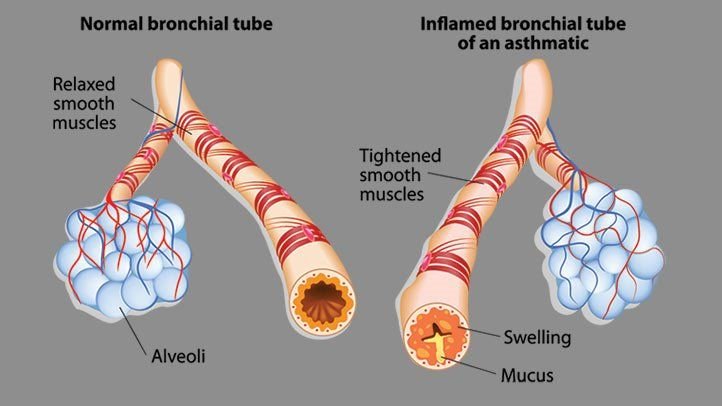
Living with asthma does not mean that you cannot enjoy a long and fulfilling life. Despite the challenges that come with this chronic condition, there are various strategies and treatments available to manage symptoms and improve your health. By taking proactive measures, such as following an appropriate treatment plan, avoiding triggers, and maintaining a healthy lifestyle, you can lead a long and vibrant life even with asthma. This article will explore the possibilities and provide valuable insights to help you navigate your journey with asthma.
Understanding Asthma
Definition of Asthma
Asthma is a chronic respiratory condition that affects the airways in your lungs. It is a long-term disease that causes inflammation and narrowing of the airways, making it difficult to breathe. The main characteristic of asthma is recurrent episodes of breathlessness, wheezing, coughing, and tightness in the chest. These symptoms often occur in response to triggers such as allergens, exercise, cold air, or emotions. Asthma can vary in severity and can be managed with the right medications and lifestyle changes.
Causes and Triggers
The exact cause of asthma is not fully understood, but it is believed to be a combination of genetic and environmental factors. If you have a family history of asthma or allergies, you may be at a higher risk of developing asthma. Additionally, exposure to certain allergens or irritants can trigger asthma symptoms. Common triggers include pollen, dust mites, pet dander, mold, tobacco smoke, air pollution, and respiratory infections. It is important to identify and avoid these triggers to minimize the frequency and severity of asthma symptoms.
Symptoms and Diagnosis
Asthma symptoms can vary from person to person, and they may range from mild to severe. The common signs of asthma include shortness of breath, wheezing (a whistling sound when breathing), coughing that worsens at night or with activity, and chest tightness. These symptoms can significantly impact your daily activities and quality of life. If you experience these symptoms, it is crucial to consult with a healthcare professional for an accurate diagnosis. Your doctor will evaluate your medical history, perform lung function tests, and may refer you to an allergist or pulmonologist for further evaluation.
Managing Asthma
Medications for Asthma
Effective management of asthma often involves the use of medications to control symptoms and prevent asthma attacks. There are two main types of asthma medications: long-term control medications and quick-relief medications. Long-term control medications, such as inhaled corticosteroids, leukotriene modifiers, and long-acting beta-agonists, are taken regularly to reduce airway inflammation and prevent symptoms. Quick-relief medications, such as short-acting beta-agonists, provide immediate relief during asthma attacks or flare-ups. It is important to work closely with your healthcare provider to determine the most appropriate medications for your specific needs.
Inhalers and Devices
Inhalers are the most common method of delivering asthma medications. They allow the medication to be directly inhaled into the lungs, where it can provide quick relief or long-term control. There are different types of inhalers, including metered-dose inhalers (MDIs), dry powder inhalers (DPIs), and nebulizers. Each type of inhaler has its own technique for proper use, so it is essential to receive instructions from your healthcare provider on how to use your specific inhaler correctly. Using inhalers with appropriate techniques ensures that the medication reaches your lungs effectively, maximizing its benefits.
Creating an Asthma Action Plan
An asthma action plan is a personalized written document that outlines the steps to manage your asthma effectively. It provides guidance on medication use, symptom management, and when to seek medical help. Your healthcare provider will help you create an asthma action plan that is tailored to your needs. It typically includes instructions on daily medication use, recognizing and managing symptoms, using a peak flow meter, and what to do during an asthma attack. Having an asthma action plan empowers you to take control of your asthma and enables others to assist you in case of an emergency.

Lifestyle Changes
Avoiding Asthma Triggers
Avoiding triggers that can provoke your asthma symptoms is essential for managing the condition effectively. It is crucial to identify the specific triggers that affect you personally. Common triggers include allergens such as pollen, dust mites, and pet dander, as well as irritants like smoke and strong odors. Take steps to minimize exposure to these triggers by keeping your living space clean and free of allergens, using air purifiers, and avoiding tobacco smoke. Additionally, it may be beneficial to avoid outdoor activities during high pollen or pollution levels. By being proactive in recognizing and avoiding triggers, you can reduce the frequency and severity of asthma symptoms.
Maintaining a Healthy Diet
A healthy diet plays a crucial role in overall well-being, including managing asthma. Eating a balanced diet rich in fruits, vegetables, whole grains, and lean proteins provides essential nutrients and antioxidants that can support lung health. Some studies suggest that certain antioxidants, such as vitamin C and vitamin E, may have a protective effect against asthma symptoms. Conversely, some foods, such as processed foods, sugary beverages, and excessive salt, may contribute to inflammation and worsen asthma symptoms. It is important to work with a registered dietitian or nutritionist to develop an individualized meal plan that supports your asthma management goals.
Regular Exercise and Physical Activity
Contrary to common misconceptions, regular exercise and physical activity can actually benefit individuals with asthma. Engaging in aerobic exercise, such as walking, swimming, and cycling, can help strengthen the respiratory muscles, improve lung function, and enhance overall cardiovascular fitness. However, it is crucial to choose activities that are suitable for your fitness level and capabilities. Prior to starting a new exercise routine, consult with your healthcare provider for guidance. They can provide recommendations on appropriate exercises, warm-up techniques, and help develop an exercise plan tailored to your specific needs.
Preventing Asthma Attacks
Identifying Early Warning Signs
Being able to recognize the early warning signs of an impending asthma attack is vital for prompt intervention. Early warning signs may vary from person to person, but they commonly include increased coughing, difficulty sleeping due to coughing or wheezing, changes in peak flow readings, and a general feeling of being unwell. By keeping track of your symptoms and monitoring changes in your peak flow readings, you can establish a baseline and identify deviations. If you notice any early warning signs, it is important to take action, follow your asthma action plan, and seek medical attention if necessary.
Using Peak Flow Meters
Peak flow meters are simple handheld devices that measure how well you can exhale air from your lungs. Regular use of peak flow meters can help you track your lung function and identify changes that may indicate worsening asthma symptoms. Your healthcare provider will determine your personal best peak flow value and establish specific zones (green, yellow, and red) based on this value. When your readings fall within the green zone, it indicates good asthma control. If they fall within the yellow or red zone, it may indicate worsening symptoms and the need for intervention. By regularly monitoring your peak flow readings, you can take proactive steps to manage your asthma effectively.
Understanding Rescue Medications
Rescue medications, also known as quick-relief or short-acting medications, are designed to provide immediate relief during an asthma attack or flare-up. These medications typically contain short-acting beta-agonists, which work by relaxing the muscles in the airways, allowing for better airflow. It is important to understand when and how to use rescue medications based on your asthma action plan. Your healthcare provider will guide you on the correct usage, dosage, and frequency of these medications. It is crucial not to rely solely on rescue medications for long-term asthma management, as they do not address the underlying inflammation in the airways. Instead, they provide temporary relief while long-term control medications take effect.

Managing Environmental Factors
Maintaining Indoor Air Quality
Creating a healthy indoor environment is crucial for individuals with asthma. Poor indoor air quality can exacerbate asthma symptoms and trigger attacks. Take steps to improve indoor air quality by keeping your living spaces clean, well-ventilated, and free from allergens and irritants. Regularly dust and vacuum to minimize dust mite and pet dander accumulation. Use allergen-proof mattress and pillow covers. Avoid using harsh chemical cleaners or air fresheners that can irritate the airways. Ensure proper ventilation, especially in kitchens and bathrooms, to prevent the build-up of moisture and mold. By maintaining good indoor air quality, you can create a safer and healthier environment for yourself.
Reducing Allergens at Home
Allergens can easily accumulate in our homes and worsen asthma symptoms. Taking steps to reduce allergen exposure can significantly improve asthma management. Regularly clean bedding, wash curtains and carpets, and dust surfaces to minimize dust mites, pollen, and mold spores. Keep pets out of bedrooms and off furniture to minimize exposure to pet dander. Consider using allergen-proof covers for mattresses and pillows. If you have a specific allergy trigger, such as pollen or dust, take precautions to minimize exposure, such as closing windows during high pollen periods and using air purifiers. By reducing allergen levels in your home, you can create a more asthma-friendly environment.
Avoiding Environmental Pollutants
Environmental pollutants, such as tobacco smoke, air pollution, and strong odors, can trigger asthma symptoms and worsen lung function. It is important to minimize exposure to these pollutants to maintain good asthma control. Avoid smoking or being around secondhand smoke, as it can seriously aggravate asthma symptoms. Pay attention to local air quality reports and limit outdoor activities on days when pollution levels are high. When possible, use exhaust fans or open windows to ventilate areas with strong odors, such as the kitchen or bathroom. By being aware of your surroundings and taking steps to avoid environmental pollutants, you can reduce the risk of asthma attacks.
Getting Regular Medical Check-ups
Importance of Asthma Monitoring
Regular monitoring of your asthma is essential for maintaining good control and preventing asthma attacks. It involves periodic check-ups with your healthcare provider to assess your symptoms, lung function, and medication effectiveness. By monitoring your asthma, you can identify any changes or worsening of symptoms early on and take appropriate action. Your healthcare provider may also adjust your medication dosage or recommend additional treatments based on your monitoring results. Regular monitoring ensures that your asthma management plan remains effective and helps prevent the progression of the disease.
Visiting an Allergist or Pulmonologist
In addition to regular check-ups with your primary care doctor, it may be beneficial to consult with specialists who focus on respiratory health. Allergists and pulmonologists are medical professionals who specialize in the diagnosis and treatment of asthma and other respiratory conditions. They have expertise in managing complex cases and can provide specialized care tailored to your specific needs. Working with a specialist can provide you with access to advanced diagnostic tests, personalized treatment plans, and up-to-date information on new treatment options. They can also help address any concerns or questions you may have about your asthma.
Regular Lung Function Tests
Lung function tests, such as spirometry and peak flow measurements, are important tools used to assess how well your lungs are functioning. These tests measure the amount of air you can inhale and exhale, as well as how quickly you can exhale. By regularly performing lung function tests, your healthcare provider can objectively evaluate the severity of your asthma, monitor changes in lung function, and adjust your treatment plan accordingly. These tests also help in determining your response to medications and whether any adjustments need to be made. Regular lung function tests play a crucial role in assessing your asthma control and overall lung health.

Maintaining a Supportive Network
Educating Family and Friends
A strong support system is crucial when managing a chronic condition like asthma. Educating your family and friends about asthma can help them understand your condition better and provide the support you need. Share information about asthma triggers, symptoms, and appropriate responses during an asthma attack. Teach them how to recognize early warning signs and help you follow your asthma action plan. By involving your loved ones in your asthma management, you can create a supportive environment where everyone knows how to assist you in case of an emergency.
Joining Asthma Support Groups
Joining asthma support groups can provide you with a sense of community and connection with others who understand what you are going through. Support groups offer a platform to share experiences, exchange information, and learn coping strategies from others living with asthma. They can also provide emotional support and reassurance during challenging times. Many support groups have both physical and online meetings, allowing you to connect with individuals who have similar experiences from the comfort of your home. Consider joining a local support group or participating in online forums to find encouragement and practical tips for managing your asthma.
Seeking Professional Counseling
Living with a chronic condition like asthma can sometimes take a toll on your emotional well-being. It is natural to feel overwhelmed, anxious, or frustrated at times. Seeking professional counseling or therapy can provide you with a safe space to explore and address these emotions. A licensed therapist or counselor can help you develop coping strategies, manage stress and anxiety, and navigate the emotional challenges that accompany living with a chronic illness. They can also provide guidance on maintaining a positive mindset and enhancing your overall quality of life. Remember, taking care of your emotional health is just as important as managing your physical symptoms.
Coping with Asthma Emotionally
Addressing Anxiety and Stress
Living with asthma can sometimes lead to increased anxiety and stress levels. The fear of having an asthma attack or not being able to breathe properly can be overwhelming. It is important to address these emotions and find healthy ways to cope with them. Techniques such as deep breathing exercises, meditation, yoga, and mindfulness can help manage anxiety and reduce stress levels. Engaging in activities that you enjoy and finding outlets for self-expression, such as hobbies or creative outlets, can also promote emotional well-being. If anxiety or stress becomes overwhelming, consider seeking professional help from a therapist or counselor who can provide you with specialized strategies to cope with these emotions.
Managing Fear and Frustration
Living with a chronic condition like asthma can sometimes lead to feelings of fear and frustration. It is normal to feel frustrated about the limitations asthma imposes on your daily life. However, it is important not to let fear and frustration overwhelm you. Remember that asthma can be managed effectively with the right treatment and lifestyle adjustments. Focus on what you can control, such as following your asthma action plan, taking your medications as prescribed, and making healthy lifestyle choices. Surround yourself with a supportive network of friends, family, and healthcare professionals who can help you navigate any challenges that arise.
Finding Inner Strength and Resilience
Coping with asthma requires resilience and inner strength. It is essential to cultivate a positive mindset and develop strategies to help you stay motivated and focused on your asthma management goals. Surround yourself with positive influences and seek inspiration from others who have successfully managed their asthma. Celebrate your successes, no matter how small, and recognize your own inner strength. Practice self-care, including prioritizing rest, engaging in activities that bring you joy, and nurturing healthy relationships. By nurturing your inner strength and resilience, you can face the challenges of asthma head-on and live a fulfilling and empowered life.

Importance of Self-Care
Taking Regular Prescription Medications
One of the most important aspects of managing asthma is taking your prescribed medications as directed by your healthcare provider. Regular use of long-term control medications helps reduce airway inflammation and prevent symptoms. It is crucial to follow the prescribed dosage and frequency of medication use. Set reminders or establish a routine to ensure you never miss a dose. If you have any concerns or difficulties with your medications, speak openly with your healthcare provider. They can provide guidance, address any side effects, and explore alternative options if necessary. Consistently taking your medications is key to maintaining good asthma control and preventing future complications.
Avoiding Self-Neglect
Living with asthma requires a proactive approach to self-care. It is important not to neglect your own well-being while managing the condition. Prioritize your physical and emotional health by eating a balanced diet, getting regular exercise, and maintaining a consistent sleep schedule. Avoid smoking and limit exposure to secondhand smoke. Stay up to date with routine medical check-ups and follow-up appointments. Take time to relax and recharge, engage in activities that bring you joy, and practice stress-management techniques. By actively caring for yourself, you can optimize your asthma management and overall quality of life.
Prioritizing Rest and Sleep
Adequate rest and quality sleep are essential for individuals with asthma. Fatigue and lack of sleep can worsen asthma symptoms and make it more difficult to manage the condition effectively. Establish a regular sleep routine and strive for a consistent sleep schedule. Create a calm and comfortable sleep environment, free from irritants and allergens. Keep your bedroom cool and well-ventilated. If asthma symptoms or coughing disrupt your sleep, consult with your healthcare provider for appropriate solutions or adjustments to your medication regimen. Prioritizing rest and quality sleep will contribute to your overall well-being and help you maintain good control of your asthma.
Empowering Yourself with Knowledge
Understanding Asthma Triggers
Knowledge is power when it comes to managing asthma effectively. Understanding the triggers that worsen your symptoms can help you avoid them and reduce the frequency of asthma attacks. Keep a record of your symptoms and triggers, noting any patterns or commonalities. Educate yourself about common asthma triggers such as allergens, irritants, and emotional stressors. By identifying your personal triggers, you can take proactive steps to minimize exposure and prevent asthma flare-ups. Stay informed about new research and developments in asthma management. The more knowledgeable you are about your condition, the better equipped you will be to make informed decisions and advocate for your own health.
Staying Informed about New Treatments
Asthma management is constantly evolving, with new treatments and therapies being developed. Stay informed about advancements in asthma treatment by keeping up to date with the latest research and medical literature. Talk to your healthcare provider about any new treatment options that may be suitable for your specific needs. Be proactive in asking questions and seeking information during your medical appointments. This will not only keep you educated about current and emerging treatment options but also allow you to actively participate in your own healthcare decisions.
Educating Yourself about Asthma
Knowledge about your asthma is one of your most valuable tools. Educate yourself about the nature of asthma, the underlying causes, and the mechanisms involved in the disease process. Learn about the different medications available for asthma management, their specific functions, and proper usage. Understand the importance of following your asthma action plan and how to recognize early warning signs. By educating yourself about asthma, you become an active participant in managing your condition. Additionally, educate your family, friends, and caregivers about asthma to enhance everyone’s understanding and support.
Living a long and fulfilling life with asthma is absolutely possible. By understanding asthma, effectively managing the condition, making necessary lifestyle changes, and seeking support when needed, you can take control of your asthma and lead a healthy and vibrant life. Remember to prioritize self-care, stay informed about new treatments, and embrace the knowledge and resources available to you. With determination, resilience, and the support of a healthcare team, you can thrive with asthma and achieve your goals while living life to the fullest.










